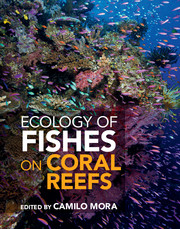Book contents
- Frontmatter
- Contents
- Preface
- Foreword
- List of contributors
- PART I BASIC ECOLOGY
- PART II PATTERNS AND PROCESSES
- PART III HUMAN FINGERPRINTS
- PART IV CONSERVATION
- PART V DEBATES AND PARADIGM SHIFTS
- 23 Is dispersal of larval reef fishes passive?
- 24 Density dependence and independence and the population dynamics of coral reef fishes
- 25 Equilibrial versus non-equilibrial dynamics in coral reef fishes
- 26 Cryptic density dependence: integrating supply-side ecology with population regulation
- 27 Priority effects
- 28 Inverted trophic pyramids
- 29 Shifting baselines in coral reef fishes
- 30 Pluralism explains diversity in the Coral Triangle
- 31 Reef fish biogeographical regions
- 32 Size and sex change
- 33 Quantifying reef fishes: bias in observational approaches
- 34 Seascape ecology of fishes on coral reefs
- 35 The future for coral reef fishes
- 36 Perpetual struggle for conservation in a crowded world and the needed paradigm shift for easing ultimate burdens
- References
- Index
25 - Equilibrial versus non-equilibrial dynamics in coral reef fishes
from PART V - DEBATES AND PARADIGM SHIFTS
Published online by Cambridge University Press: 05 May 2015
- Frontmatter
- Contents
- Preface
- Foreword
- List of contributors
- PART I BASIC ECOLOGY
- PART II PATTERNS AND PROCESSES
- PART III HUMAN FINGERPRINTS
- PART IV CONSERVATION
- PART V DEBATES AND PARADIGM SHIFTS
- 23 Is dispersal of larval reef fishes passive?
- 24 Density dependence and independence and the population dynamics of coral reef fishes
- 25 Equilibrial versus non-equilibrial dynamics in coral reef fishes
- 26 Cryptic density dependence: integrating supply-side ecology with population regulation
- 27 Priority effects
- 28 Inverted trophic pyramids
- 29 Shifting baselines in coral reef fishes
- 30 Pluralism explains diversity in the Coral Triangle
- 31 Reef fish biogeographical regions
- 32 Size and sex change
- 33 Quantifying reef fishes: bias in observational approaches
- 34 Seascape ecology of fishes on coral reefs
- 35 The future for coral reef fishes
- 36 Perpetual struggle for conservation in a crowded world and the needed paradigm shift for easing ultimate burdens
- References
- Index
Summary
Views on the dynamics that populations and communities of coral reef fishes exhibit have changed dramatically over the last several decades, shifting from equilibrial to non-equilibrial. Evidence for both types of dynamics has been detected in reef fishes, but one's perception of the prevalent form of dynamics probably depends mostly on one's definition of these concepts. The geographically widespread and spatially subdivided metapopulation structure of most reef fishes is expected to generate mathematical density dependence in per capita recruitment rates, which allows subpopulations to persist or to be resurrected. Strong selection within some subpopulations experiencing resource limitation may at least partially explain the great diversity of reef fishes. Rather than attempt to categorize the form of dynamics that reef fishes exhibit, we should strive to understand and measure the key attributes that will allow us to predict population and community dynamics.
Populations and communities of coral reef fishes fluctuate over time in abundance and composition. Anyone who has studied coral reef fishes at a single site over multiple years will have noticed these shifts in absolute and relative abundance. Do these dynamic patterns indicate that populations and assemblages of coral reef fishes are non-equilibrial? The prevailing views on this question have shifted wildly over the last several decades, both reflecting and driving views in the broader ecological literature.
Today, I suspect the answer a reef fish ecologist will give to the question of equilibrial or non-equilibrial dynamics will depend primarily on how they define these concepts, which are defined differently by different authors (reviewed in Rohde [2167]). Some influential reef fish ecologists [e.g. 2239], take a stringent view of equilibrial dynamics, which would call for quite stable population sizes and assemblage structure over time, with rapid returns to the equilibrium condition after perturbations, or close to a “balance of nature”.
- Type
- Chapter
- Information
- Ecology of Fishes on Coral Reefs , pp. 232 - 235Publisher: Cambridge University PressPrint publication year: 2015



